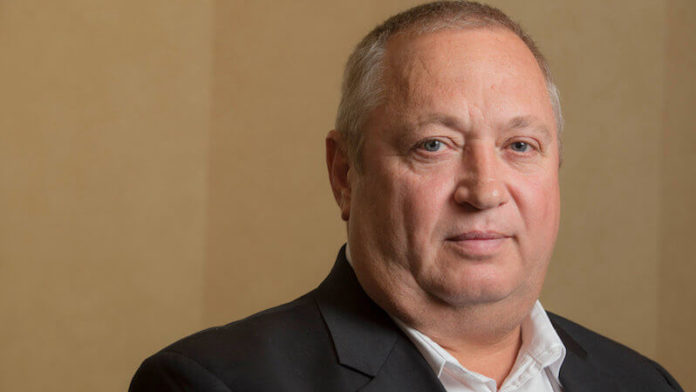
Sibanye-Stillwater’s CEO, Neal Froneman, turned 60 this year – an anniversary that’s hard to ignore. Seasoned though he may be, Froneman still gets cast in the role of contender. Why, despite a spectacular seven years at Sibanye-Stillwater, is one of Johannesburg’s most reputed deal-doers, so renowned?
“I believe I still have another three, four, or maybe five years, but I will keep an open mind,” says Neal Froneman, CEO of Sibanye-Stillwater in an interview with Miningmx in June. He is referring to a report earlier this year in which his name and ‘retirement’ were mentioned in the same headline.
Ironically, Froneman is speaking via video link from Florida where a quarter of the US state’s population are retirees. Lately, the Sunshine State has a less welcome reputation: ‘God’s waiting room’ – a sobriquet related to its high incidence of COVID-19 fatalities.
Nonetheless, Froneman decided to sit out the lockdown there rather than risking the long-haul flight back to Johannesburg. “We came across for the re-listing of Sibanye on the New York Stock Exchange; then we had a bit of marketing to do and they very quickly closed down all the international flights and, fortunately, I have a residence here.”
Sibanye-Stillwater re-listed in New York in order to accommodate the platinum assets it had been accumulating over the last three years: the R30bn Stillwater Mining deal, as well as the Rustenburg assets of Anglo American Platinum and Lonmin.
I remain concerned that there could be some tough times ahead in the next six months as the global economy sort of rights itself.
As for retirement, it really isn’t on the cards, and even if it were, what would it portend for Sibanye-Stillwater? He could leave tomorrow and the company would be fine, he says. “There are a number of internal successors waiting in the wings.” (One wonders if Justin Froneman, his eldest son, and integral to the Stillwater deal, is one of them?)
Even after Sibanye-Stillwater, Froneman isn’t anticipating anything else but work. “I don’t think it will be the ending of my career to be honest; it probably might be an appropriate time to hand over the baton, but I’m still a very young 60.”
Froneman splits opinion. Could it be he frequently courts failure with his bold expansionary talk, or just irks the hell out of people with his outspokenness? Or perhaps, he’s the classic outsider: no fancy private-schooling, unpolished perhaps, the accent deeply rooted in Johannesburg.
Whatever the answer is, he also has the knack of proving his doubters wrong – Sibanye-Stillwater’s seven-year rise to prominence a case in point. Now on the cusp of resuming dividend payments, which his critics said would be impossible following the takeover of Stillwater Mining in 2017, Froneman claims to be unconcerned with detractors.
“I don’t specifically aim to prove people wrong, I just do what I think is my job. It’s not about being different, it’s actually about not getting sucked into the same groove where everybody is comfortable and nobody takes risks.
“If you don’t take risks, there are no real returns, or let’s call it exceptional returns, just average returns.” He claims to have largely positive feedback from past shareholders; they’ve made money. “I suppose you don’t often meet critics because they don’t want to meet you.”
A dividend declaration might not be at the half-year point, however, as previously ‘hinted’ in February (actually, Froneman pretty much proclaimed it). That’s because COVID-19 has changed the game so much that’s it’s impossible to say today, in late June, what the economics might dictate in August when Sibanye-Stillwater’s board is to meet.
The unions have no sense of reality. There is completely no sense of the business imperative; the lack of understanding of the commercial realities and what is in the national interests.
“I remain concerned that there could be some tough times ahead in the next six months as the global economy sort of rights itself. I think the worst of COVID-19 is coming.”
Economists are fond of speaking in terms of shapes when they discuss future recovery; which is to say, China is experiencing a V-shaped fall and rise. But Froneman thinks the scenario for Europe and the US is a different thing entirely to China.
“I sense there’s lots of pain coming with the dollar, which means that the rand could well strengthen to significant levels, which is surprising considering the mess our economy is in,” he says of South Africa, where the majority of the firm’s gold and platinum revenue is generated. “Some commodity price benefits could well be evaporated by a dollar that collapses.”
For all his rough edges, Froneman generally offers a genial public face. In two decades of writing on his career, I struggle to remember him losing his temper. Two interlinked subjects raise his ire, however: union tactics and government policy.
Froneman has good words for mineral resources and energy minister, Gwede Mantashe, whom he describes as supportive. It’s a view that’s been particularly enhanced by the COVID-19 crisis, during which Mantashe has tended to let mines manage themselves in a way that would be welcomed were it extended to other areas of industry activity.
Unions, though, have Froneman in a froth. “That sounds harsh,” I suggest, almost certain he’ll want to retract his comments about union relations. “No, those comments can stay,” he says.
“The unions have no sense of reality,” he says – a reference to national leadership as grassroots relationships tend to be quite different. “There is completely no sense of the business imperative; the lack of understanding of the commercial realities and what is in the national interests.
“They are completely focused in a way, very selfishly, only on the well-being of their members and not on the national interests of the country. That is unsustainable. Their focus is unsustainable.”
It’s quite likely he’s referring to Association of Mineworkers and Construction Union (AMCU) president, Joseph Mathunjwa. Froneman and him, they don’t get on. AMCU’s six-month strike, which started in November 2018 heavily disrupted Sibanye-Stillwater’s gold production for the 2019 financial year and ended in the self-same settlement AMCU previously rejected. Then came the court obstructions laid by AMCU that delayed the firm’s takeover of Lonmin.
As for Froneman’s view on government, that was articulated quite widely in national media in May. An ANC economic transformation committee paper constructed by its committee head, Enoch Godongwana, raised again the prospect of ‘prescribed assets’ – the forced investment of private pension funds into designated government projects – albeit in different terms, called ‘guidance’. It’s a matter the investment sector thought had been discussed and buried two years ago.
“Economically, I’m not optimistic,” says Froneman. “I’m yet to see constructive and investor-friendly plans.”
At the time of writing, finance minister Tito Mboweni’s supplementary budget had etched out an economic scenario that sees an expanding account deficit for at least the next three years. Public debt as a percentage of GDP will only stabilise in 2023/24 at the high 80% level. It’s sobering information that profoundly influences all areas of investment sentiment: the so-called South African discount.
At the moment, emerging market investment is rising but that’s not to confuse it with foreign fixed investment, of which there has been a tragic shortage in South Africa. Froneman thinks the discount is real and sits squarely on the Sibanye-Stillwater share.
“Yes, absolutely there is a real South African discount and when you try and engage with international companies in terms of relationships, they are not interested because it’s not difficult to see why it’s (South Africa’s) not investor friendly,” he says.
While sovereign-related discounts clearly exist, the discount Sibanye-Stillwater labours under relative to its platinum group metal (PGM) peer group is entirely within the firm’s own orbit. That’s its high level of debt, incurred following the PGM acquisitions of the past few years, and which also included an all-share bid for control of DRDGOLD, the gold re-treatment company.
Said Arnold van Graan, an analyst for Nedbank Securities in a report earlier this year: “… the company’s net debt-to-EBITDA (earnings before interest, tax, depreciation and amortisation) gearing remains sensitive to metal prices.
“We believe there is a risk that the COVID-19 related headwinds could somewhat undo what has been a very good turnaround and delivery story over the past year,” he said. “This could also raise concern about the balance sheet again, despite improvements over the past six months.”
It’s not our priority to do M&A … I do think that next year we will be in a position to have reinstated our dividend, pay down our debt and we could then start actually looking at doing due diligence and, by then, international travel will have opened up.
Froneman’s view of the risk is mirrored in the timing of the dividend resumption. Operationally, however, the company “isn’t stressed”. The focus is falling on the well-being of employees and the outcome has a certain serendipity to it: “We are finding that with 50% of our workforce we are achieving well in excess of 50% of production. So there’s a new normal developing.”
Froneman wouldn’t be Froneman without the conversation turning to possible merger and acquisition activity. This time there are no immediate plans. We’ve heard that before, but Froneman says there’s an existential undertaking not to do anything now, notwithstanding previous comments he has made that the firm is in the market for silver or battery metal production. And anyway, getting a due diligence study away under current border and travel regime is hard to do. “It’s not our priority to do M&A,” he says.
But there’s a time when it will be. That’s why Sibanye-Stillwater bought research house SFA Oxford, the UK business that is primarily pointed at PGM market research. It has been studying the possibility of buying up battery metals to complement PGM production in the automotive drive-train.
“I do think that next year we will be in a position to have reinstated our dividend, pay down our debt and we could then start actually looking at doing due diligence and, by then, international travel will have opened up,” he says.









